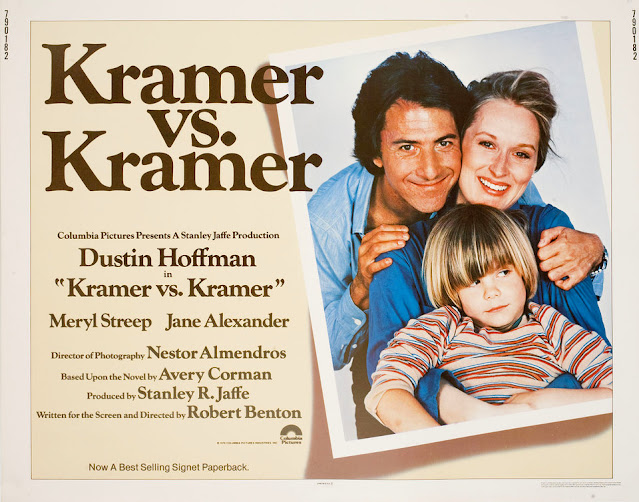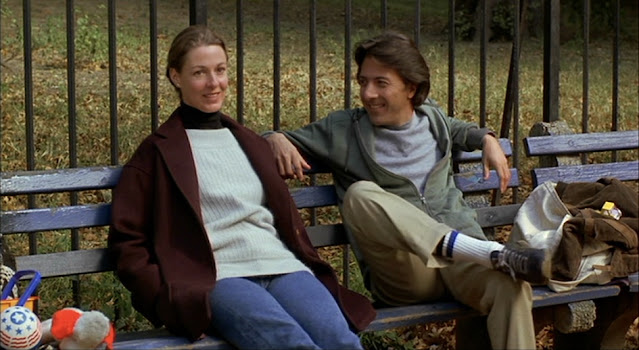One of the toughest subjects for me to look at, whether it be in film or in real life, is divorce. I recognize that there are situations where divorce is necessary, specifically in the case of abuse or infidelity, but I believe in most cases divorce is avoidable if both parties are willing to put in the effort to make it work. That is not to make light of a person’s situation that may have led to them getting a divorce, though. I don’t know the ins and outs of everyone’s marriages or former marriages, nor would I presume to cast judgment. This is a tricky, often delicate subject, and that is one of the reasons I don’t like tackling it. Inevitably, no matter my opinion on the subject, it is sure to offend someone out there.
In 1979, when Kramer vs. Kramer was released to theaters, the world was going through a divorce epidemic. Women’s lib was supplanting the traditional family where the husband went to work and the wife stayed home and tended to the house and the children. Women were wanting to get back into the field and were getting tired of being labeled homemakers. The whole world was changing, and not all of it was for the better. While not everybody feels this way, there is a growing nostalgia for the days when owning a home didn’t require both parents to be working all of the time. Nowadays sometimes even that isn’t enough. In the 70s, though, there was this growing feeling that life wasn’t fulfilling without a career, and the men were out of touch with women’s feelings because they were out of the house all the time, often neglecting the emotional well-being of their wives.
It is within this setting that we get Kramer vs. Kramer, a film that looks at this exact couple, breaks them apart, then examines life as a single parent father, raising a son while balancing the well-being of his family. Whether you are a single father or a single mother, being a parent without the help of a partner is one of the most challenging things to do in life. Having a young child you are dependent on while also trying to make a living is taxing at the very least. It’s even worse if that job is demanding and requires you to be available to work outside of the traditional 9-to-5.
Dustin Hoffman is playing Ted Kramer, an advertising executive who works long hours in New York City. On the night he is informed he is to be promoted thanks to landing an important client, he comes home to find that his wife, Joanna (Meryl Streep), has packed her bags and is leaving him. She is also leaving behind their seven-year-old son, Billy (Justin Henry). Without Joanna to take care of the apartment and Billy, Ted is forced to make things work at home and on the job, having to make allowances for times when Billy is sick or needs him to attend a school activity. This cuts into his work time, which eventually leads to him being fired.
Losing his job comes at an inopportune time as Joanna has come back to New York City and is seeking custody of Billy. Ted fights her in court, having learned from the year and a half she has been gone how to be a good father, but the courts at this time heavily favor the mother in custody battles, and he’ll have an uphill battle to convince them to side with him. The one thing he will not do, though, is put his son through the hardship of being called into court to testify. That would be too much for the young boy who is already confused enough with what is going on between his parents, and Ted will not put him through the horrors of having to answer questions from a bunch of indifferent lawyers.
Divorce is nasty enough when children are not in the equation. When it becomes a custody battle, things can get really ugly, and the ones who suffer the most are the kids. It’s heartbreaking spending so much of this movie seeing Ted change as a person and reprioritize his life only to have Joanna come back into the picture and attempt to take Billy away from him. At the same time, Joanna shouldn’t have to lose access to her child, either. Based on what we learn about her and what she has been doing since she left, it is difficult to justify the court’s decision beyond it being a sign of the times. Modern-day sensibilities determine that this would probably be an open-and-shut case in favor of the father in large part thanks to Joanna abandoning her child in the first place. It would have, at the very least, given Ted better terms for the custody than he got.
The film tries to paint Joanna in a sympathetic light while at the same time not minimizing what she did when she abandoned Billy. In the opening scene as she is telling Ted that she is leaving him, she tells him flat-out that she will not be taking Billy with her. Now, granted, she is in a mental state where she is not thinking clearly, but that only excuses so much. When she comes back into the picture, we still only see things from Ted’s point of view. This is an interesting choice for director Robert Benton to make as it makes it harder for us to be conflicted on who to root for. To counter that, we get scenes of Ted being the quintessential workaholic, coming home late after some feeble attempt to go straight home after work. When he does show up, he is clearly looking right through his wife, excited to share the good news from work while missing the clear signs that there is something seriously wrong in the home.
Once Joanna has left him, it becomes obvious that he has no real clue how to take care of his kid. He’s burning breakfast, scrambling to get his kid ready for school, and very much out of his element, a clear indication of how little he was actually involved in his kid’s life before Joanna left. He had taken her and Billy for granted for so long that things needed to change. Forcing him to take over both roles gave him a better appreciation for his wife, and when she comes back into the picture, he hates it when his lawyer gets too hard on her on the witness stand. He still loves her even though he admits to Billy and himself that they will never be married again.
I would be remiss if I didn’t at least mention that there was a great deal of conflict behind the scenes between Meryl Streep and Dustin Hoffman. Streep was fairly new on the scene, accumulating just a few small roles over the previous two years before being cast in Kramer vs. Kramer. Hoffman, who was a method actor, used a recent personal tragedy in her life to evoke an emotional response, ostensibly to get a better performance out of her. He also allegedly got violent with her, throwing a wine glass against the wall near her head without warning and slapping her. In one interview, Streep even stated that he groped her during their first meeting. Knowing this now, it becomes harder to forget it when watching the two on screen. It’s not always easy separating the artist from the art.
This is a film that is brutally honest about the hardships of marriage, the trappings of divorce and custody hearings, and the importance of finding a good balance in your work/family life before you lose it. While I appreciated the message it was conveying, I struggled with the final resolution a little because it felt like it was wrapping things up too easily. The emotion of that final scene was there, but it also didn’t fully ring true for me, either. It wasn’t ruinous, just a little eyebrow-raising how things finally resolved.
This is an actor’s film, there to showcase what talented performers can do if given the right material. It turns out they can do amazing work when given the right parts. Four acting nominations came out for this picture at the Academy Awards, including one for the then eight-year-old Justin Henry, making him the, to date, youngest performer nominated for an acting Academy Award. Kramer vs. Kramer would go on to win the Best Picture Oscar and have a significant effect on the cultural views of marriage and gender roles. While it gave equal weight to both parents’ point-of-views, it also depicted the lopsided views of the legal system in favor of the mother, something that is slowly changing but is not quite there as of yet. This is a heart-wrenching drama that deserves the accolades it got at the time and holds up well to modern audiences.
Academy Award Nominations:
Best Picture: Stanley R. Jaffe (won)
Best Director: Robert Benton (won)
Best Actor: Dustin Hoffman (won)
Best Supporting Actor: Justin Henry
Best Supporting Actress: Jane Alexander
Best Supporting Actress: Meryl Streep (won)
Best Screenplay - Based on Material from Another Medium: Robert Benton (won)
Best Cinematography: Néstor Almendros
Best Film Editing: Gerald B. Greenberg
____________________________________________________
Release Date: December 19, 1979
Running Time: 105 Minutes
Rated PG
Starring: Dustin Hoffman, Meryl Streep, Justin Henry, and Jane Alexander
Directed By: Robert Benton









Comments
Post a Comment